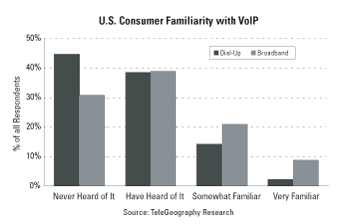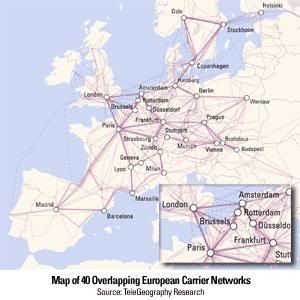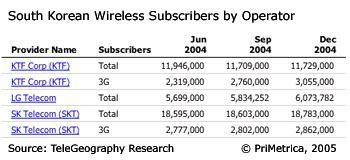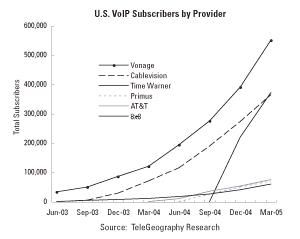- Indosat contracts Nokia for GSM expansion
- Indonesia to force telcos to buy local goods
- Indonesia's Bakrie Telekom eyes $49m from IPO
- Good bye i-mode, welcome FeliCa
- China signs agreement to invest $20b in Indonesia
- Internet Traffic Growth Slows by Half in 2005
- Internet users reach 130m
- TA Orange targets rural regions; expects 4.2 milli...
- Telcos predicting strong growth over next five years
- VSNL Buys Top VoIP Carrier
Huawei partners cooperatives in wireless venture
Minister predicts ‘One India’ telecom tariff soon
Opposition to privatisation continues
Users may have to register to pay-as-they-go
200506-17: Telekom Malaysia's denial
200506-16: 30% of US broadband subscribers unaware of VoIP
The survey of 1,500 households, conducted as part of TeleGeography's new US VoIP report, also covered price sensitivity and service concerns.
Some of the key findings include:
52% of online households said they were likely to subscribe to a flat-rate VoIP service package if it was priced at USD30 per month
Only 30% of online households were likely to replace their existing landline phone with VoIP if automatic 911 services were unavailable in the VoIP package
76% of online households said they would completely replace their existing phone service if they subscribed to VoIP
Many of the most likely VoIP subscribers are also considering wireless substitution for their home phone line as well.

200506-15: Eight companies to bid for PTCL
200506-14: Army takes over PTCL installations
ISLAMABAD: Army and paramilitary troops along with police Saturday assumed control of the state-owned telephone facilities across the country, shortly after the date for sale of the Pakistan Telecommunication Corporation Limited (PTCL) was announced.
"We have deployed regular troops, Rangers and police at 150 PTCL installations throughout the country," confirmed Director-General Inter Services Public Relations Major-General Shoukat Sultan.
He said the troops and police were deployed at the request of the Ministry of Communication through the Ministry of Defense. "The assistance is being provided in term of technical matters to run communication and to protect sensitive installations."
The move is in the backdrop of negotiations between the government and PTCL employees union held before June 5 and which failed to make headway. PTCL exchanges would now be operated by army technicians from Signals Corps.
"It’s done," said Gen Sultan when asked whether troops had taken over PTCL installations. "This is a transitory step to run the communications uninterrupted ...I have not heard of any resistance from any one against this move to protect telephone exchanges," he added.
Gen Sultan said the security forces would remain deployed as a long as the government requires. To a question, he said that technicians from Signals would replace the entire technical staff of the PTCL.
He said the takeover was mulled substantially earlier and troops were ordered to stay ready in the event the trouble gets worse and out of control.
Unions plan complete nationwide strike
On the other hand, the PTCL Workers Action Committee leader Ziauddin and Malik Maqbool rejected the package, saying they would not compromise their principled position as a bargain for the sale of government entity.
"We have decided to give a strike call to our employees and would hope the government would come to the negotiating table with a free mind," said Ziauddin while talking to The News by telephone.
He said it was the unanimous decision of the 26-member committee of the employee unions that the privatization should be rejected outright. Zia said, "The government’s time-buying tactics will not work any more and if the talks remain fruitless we are going to jam the entire system on the night of June 14."
The News learnt that some 10 employees, including three union leaders, have been arrested or missing with their mobile phones switched off.
In a brief remark, the Telecom Association of Pakistan hoped the deregulation process would continue unhindered with the army’s takeover of the installations.
200506-13: Army takes technical control of PTCL
200506-12: Striking Employees are Terrorist: Federal Minister
He warned that strict action will be taken against those who violate the NIRC verdict, adding, any one found involved in such activities will be dealt with an iron hand.
The minister said any negative step by the trade union’s leaders could deprive them of the incentives announced by the government for them after announcing privatization of PTCL.
He said the privatization of PTCL is fully in favor of PTCL’s workers. He said the privatization of PTCL will be held on the due date. Sherpao said “those threatening the government against the privatization of PTCL are terrorist according to the law. They will face trouble if they continue their anti-state activities.”
200605-11: 500 Govt Employees held in crackdown
13th June 2005
ISLAMABAD: The Pakistan Telecommunication Company Limited (PTCL) Employees Union claimed that authorities had arrested 500 workers and the union had damaged the fiber-optic cable linking Quetta with other parts of the country.
At a press conference in Karachi, the PTCL Union Action Committee’s central leader gave the government a 24-hour ultimatum to withdraw its proposal to privatize the company and release all arrested employees. He said the union had set June 15 as the deadline to jam the system against the proposed privatization, but the plan had been rescheduled now that its leaders and workers had been arrested.
The union leader said that 500 workers had been arrested throughout the country and the police had raided his and other leaders’ houses. He warned the parties interested in buying the company against participating in bidding, saying, “The workers will stop them.”
200506-10: Mobile Music Value Chain
Pyramid Research CMT Director Guy Zibi argues that “the number of parties in the mobile music value-chain is one of the key obstacles for the development of a workable business model.” The crowded mobile music value chain must pass through music companies to publishers through the mobile operator to the end user.
The reluctance of mobile operators to support the Motorola/iTunes mobile handset indicates how actively mobile operators wish to grab a piece of the pie. This reluctance, Pyramid Research asserts, is another key obstacle facing the evolution of mobile music. Initially, mobile carriers will wield all their power to become a key part of the value-chain. They will face the challenge of recouping the cost of downloading a 3Mbps - 4Mbps file over-the-air without charging too much.
Some argue that end-users will be willing to pay US$2-US$3 per song, with a premium afforded towards mobility; however, Zibi contends, “Apple’s iTunes has essentially set a psychological barrier at US$1 for a download and the mobile industry must bring the cost to consumers down into this price range.”
200506-9: Vietnam mobile charges due to drop
200506-8: Fraudsters use IPODS to steal corporate data
more...
200506-7: Top ISPs host most infected computers
more..
200506-6: Siemens name to disappear by December?
200506-5: Internet access in China
200506-4: Finance: EWI says attempts to sell V-Mobile are Bad
200506-3: Most Intercity Bandwidth Still Unlit
For example, the 32 terrestrial carriers connecting to the New York metropolitan area have a combined potential capacity of 818.2 Terabits per second. Of that, only 22.6 Terabits per second -- 2.8 percent -- of network bandwidth is actually lit.
However, the aggregated fiber glut does not translate to a bandwidth glut for all carriers on all routes. In fact, many carriers are actually running out of bandwidth on certain network segments, and are having to face unwelcome network upgrade costs. For certain, they won't need to lay new fiber. But lighting dark fiber or adding wavelengths on existing fiber can be extremely expensive, and carriers may have a hard time taking on major new costs in what is still a very competitive market subject to rapid price erosion.

200506-2: Top and Bottom Wireless Markets
While 2004 was the year in which 3G services became a reality for many, new research from TeleGeography shows that 3G subscribers account for only a slim percentage of mobile users around the world.
According to GlobalComms, TeleGeography's online encyclopedia of wireline and wireless telecommunications markets, early 3G introducers Japan and South Korea claimed the highest percentage of users, at 12.5% (10.79 million 3G users) and 16.1% (5.9 million) respectively, while Italy and the U.K. fell significantly behind, with 3G users accounting for 4% of all subscribers in these two countries.
Globally, 3G accounted for less than 30 million users in 2004, but TeleGeography expects total subscribers to more than double in 2005.
Mobile Haves- and Have-Nots
Another sign of the times is wireless penetration rates of over 100%; at the end of 2004 there were ten countries which reported this phenomenon, ranging from Luxembourg (a staggering 135%) to Germany (102%). At the other end of the scale, 35 of 159 countries covered in GlobalComms had wireless penetration rates of less than 5%, including India (3.5%) and Bangladesh (2.7%).
In terms of the expansion of subscriber bases, 19 countries achieved triple-digit growth in 2004. Top of the list was Iraq, which reported a massive 1,757% increase in subscribers to 1.2 million; further down the list were Nigeria (170% to 8.79 million) and Pakistan (139% to 8.51 million). Eastern Europe, too, saw three countries enjoy growth of over 100%: Belarus (120%), Ukraine (111%) and Russia (104%). By contrast, Iceland managed annual growth of just 2.6%.

200506-1: U.S. Residential VoIP to Exceed $1bn in 2005
As of today, the largest provider of home VoIP service has been Vonage, which entered the market early but does not own a communications network of its own. Close on the heels of Vonage now are the cable companies, which have a huge installed base of broadband customers and nearly ubiquitous connectivity. By the end of 2005, TeleGeography predicts that Cablevision, Comcast, and Time Warner together will have 2 million subscribers and nearly one-half of the total residential VoIP market.
This analysis is excerpted from the U.S. VoIP Report, TeleGeography's new study of carriers and consumers of broadband voice service in the U.S.
